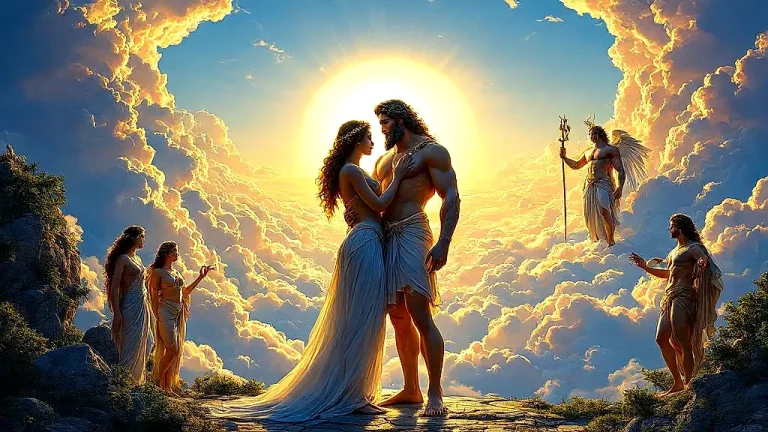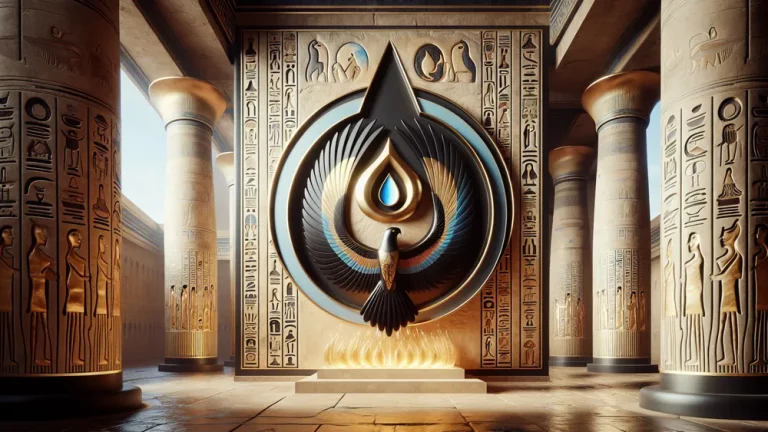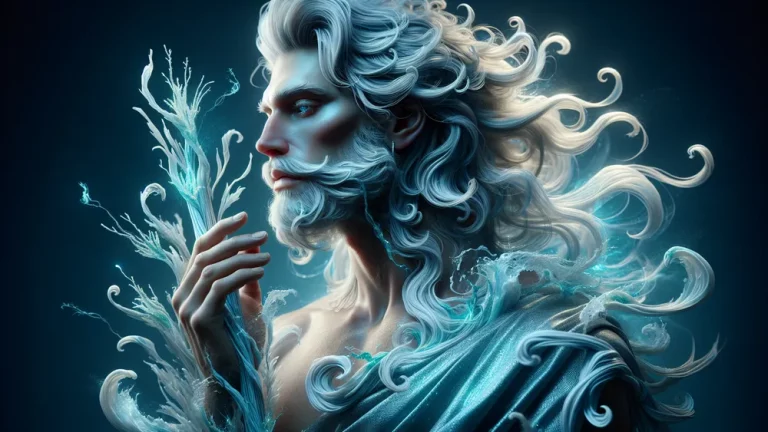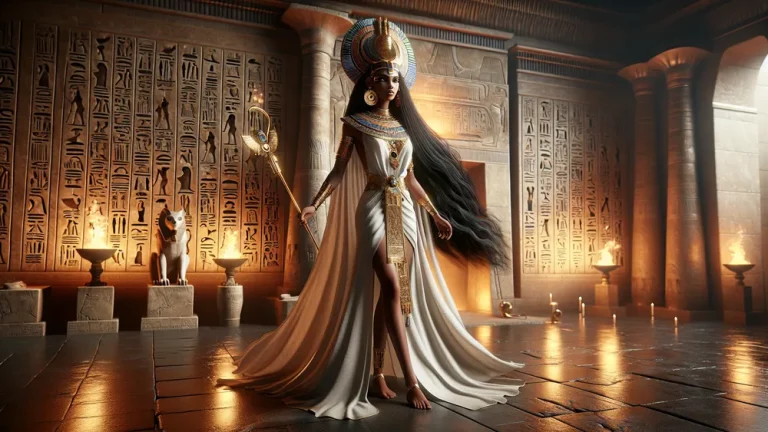Fa: The God Of Destiny In Ancient Egyptian Mythology
Within the broad story of old Egyptian beliefs, where gods and goddesses create the cloth of the world, Fa is important, being the idea of destiny.Imagine a big music event where every part is planned carefully to make good sound; Fa is the leader, directing the lives of people and nations, too.
Key Points:
- Fa is the God of Destiny in ancient Egyptian beliefs.
- He guides the fate of people and nations.
- Fa is linked with symbols like the ankh and the scepter.
- His presence is noted in texts like the Pyramid and Coffin Texts.
- People worshipped Fa through rituals, offerings, and festivals.
- Modern culture still reflects Fa’s influence in stories and spiritual practices.
- Fa connects to other deities of destiny, like the Moirai in Greek mythology.
In this look at Fa, the God of Destiny, you will see how his power touched the Egyptians of the past, changing how they thought about fate and everything. This start is your entrance into a place where higher powers were thought to control life, preparing you for more about Fa’s beginnings, meaning, and importance in the next parts.
Fa: Overview and Key Facts
| Key Aspect | Description |
|---|---|
| Name | Fa |
| Role | God of Destiny |
| Cultural Start | Old Egyptian beliefs |
| Symbols | Often linked with items like the ankh (life sign) and the scepter (power sign) |
| Main Sources | Noted in old Egyptian writings and objects, but not shown as much as other gods like Ra or Osiris |
| Influence | Means to guide where people’s and countries’ paths go, lining up with what gods wanted |
| Similar Deities | Has ideas like gods from other stories, like the Moirai (Fates) of Greece and the Norns of North tales |
| Worship Actions | Included rituals, gifts, and maybe group events to honor Fa and seek luck in fate |
| Art Illustrations | Appeared in different sorts of old Egyptian art, though specific images might differ and showed up less often than major gods such as Horus |
| Present Impact | Fa’s ideas and themes stay alive in today’s media and spiritual activities, showing continuing attention in thoughts of fate and what happens |
What’s Up With Fa in Egyptian Mythology
When we look closely at the mysterious part of Fa in Egyptian Mythology, we get to see the beginnings, meanings, and cultural importance that make this god interesting.
Where Did Fa Come From?
The beginnings of Fa in old Egyptian stories go back very long ago, kind of like gradually seeing a character in a never-ending story. When Fa appeared as the God of Destiny, part of the complex story of Egyptian beliefs, gods and goddesses explained life’s and the world’s mysteries. In this way, Fa was a significant and feared power over people’s and countries’ paths.
Stories about Fa likely went from mouth to mouth before being written down in old Egypt. These tales, like pieces of a big story, were part of what made old Egyptian culture what it was.
To see why Fa mattered, we look at main things that talk about this mysterious god. They aren’t as many as for big gods like Ra or Osiris, yet they tell us a lot about Fa’s role and traits. Main things to check are:

- The Pyramid Texts: Old burial writings from the Old Kingdom talk about gods, Fa included, showing their roles in life after death.
- The Coffin Texts: Middle Kingdom spells expand on gods like Fa, helping guide through life after death.
- Artifacts and Writings: Items like charms and temple writings mean Fa, letting us see how ancient people saw and worshipped this god.
Fa, the God of Destiny, played a crucial role in ancient Egyptian beliefs, influencing people’s lives and the understanding of the afterlife through various texts and artifacts.
The Meaning and Traits of Fa
In the mix of Egyptian signs, Fa is linked with powerful images like the ankh and the scepter, each having deep meanings because they mean he is the God of Destiny. The ankh, looking like a cross with a loop on top, is well-known as a sign of life and never-ending existence.

It is a key that opens life’s mysteries and fits for a god who controls what happens to both people and countries. The scepter, seen as a sign of rule and might, is like a leader’s stick directing the music of life. These are not just decorations; they mean Fa’s job is to watch over how things happen, keeping things in their place.
By using these signs, Fa is seen as a protector of fate, handling the complex motions of life with care and aim.
How Fa Affects Destiny and Fate
In Egyptian stories, Fa was seen as a holy controller of fate, using his power over people’s lives and whole countries’ paths. Think of Fa as an expert in control, moving life’s parts to make each move fit with the universe’s plan. Egyptians had their strong beliefs that gods actively joined human happenings where one might ask Fa for help to have a good life path.
But rulers, too, could call on him to guide their lands in tough times. Such holy help was planned, keeping things balanced in the world, because Egyptians thought fate was strong and both fixed and moving.
To see Fa’s part, look at gods like him in other stories. Moirai from Greek mythology are interesting to think about. While Fa’s job was done alone, the Moirai, who are three sisters, together manage everyone’s life thread. Here is a look at what they do:
| Deity/Deities | Mythology | Role in Destiny and Fate |
|---|---|---|
| Fa | Egyptian | One god managing personal and national fates, keeping things balanced |
| Moirai | Greek | Three sisters (Clotho, Lachesi, Atropos) working with life threads, spinning, and measuring |
This table means how different ideas on destiny’s power appeared, Fa being a single, strong force, and Moirai working together to run life’s length for each being.
Fa in Egyptian Art and Stories
In ancient Egyptian art and writing, Fa is shown with respect for his high place as the God of Destiny. Pictures of Fa usually have symbols of strength and life, like the ankh and scepter, similar to how symbols are important today. These can be seen in temple cuts and tomb drawings. Fa appears to guide people’s fates because of his important role in Egypt’s spiritual and daily life.
Meanwhile, in stories, Fa fits into myths where he acts as a smart and fair judge of fate. A main work that means a lot is the Book of the Dead, full of spells helping dead people in the afterlife, where Fa’s job as a destiny guard is big.

These art and story parts not only mean the old Egyptians believed a lot in the power of destiny but also act as lasting cultural pieces that keep drawing interest and help us see their world better.
How People Worshipped Fa
We know about Fa’s important role in art and stories. Next, people looked at the ways ancient Egyptians meant their respect for this god through worship and ritual.
Temples and Special Places
In ancient Egyptian times, Temples made for Fa were not only places where people met but also architectural wonders that showed the greatness and respect tied to this god. One main place is the Temple of Fa in Thebes, a city known for its spiritual importance.
Walking among its tall columns feels like stepping into a big church today, where the size and detailed carvings make people feel amazed and devoted. These places usually had big open areas and inner rooms that indicated Fa’s godly role in leading destiny. They were made very carefully to fit with the stars, and it means the link between the gods and the world.
Such holy spaces acted as centers for religious actions and village meetings, showing how they mattered in the cultural and spiritual life of ancient Egyptians.
Temples for Fa in ancient Egypt were impressive structures that served as important centers for worship and community gatherings, reflecting the god’s significance in people’s lives.
Rituals and Gifts for Fa
In ancient Egyptian spiritual practices, rituals for Fa were complex events meant to honor his place as the God of Destiny. These often happened in big temples where priests were the go-betweens between gods and people, doing sacred tasks. It’s like a detailed performance, where actions and chants, much like a show today, kept people interested. People would say prayers and chants for guidance from Fa in their lives.
Moreover, these events were not just about worship but about fitting into the cosmic order Fa ruled, making sure there was balance.
Offerings for Fa appeared as a vital part of these rituals, each with its own meaning. Typical offerings included:
- Bread and Beer: They meant food and success, important in gifts, showing the group’s reliance on Fa for everyday needs.
- Incense: It cleaned the area and pleased gods, meaning the change from worldly to spiritual.
- Precious Metals and Stones: Giving gold and lapis lazuli meant richness and never-ending life, showing a wish for Fa’s good things in life and spirit.
- Figurines and Amulets: These showed the giver’s devotion and meant to carry Fa’s guarding powers.
Through these offerings, the old Egyptians meant their respect and wanted to keep a good bond with Fa, to have their futures under his good control.

Celebrations Honoring Fa
Festivals for Fa were lively events. They formed a big part in ancient Egypt’s culture and acted as both religious times and community meet-ups. It’s like national holidays today, where everyone got together, honoring Fa’s role in their futures. The celebrations included marches with statues of Fa carried through the streets. Music and dance, plus the beat of drums, created a mood of joy and respect. People wore big costumes and masks.
They meant their link to gods and the parts they played in the universe’s order. These festivals were not only about praying. They were about making community ties strong and together values, so they stayed connected. Through these events, the old Egyptians showed how thankful they were to Fa, wanting his help with their futures.
Fa’s Impact Today
After we explored ancient practices and events celebrating Fa, it is time to move our attention to how this god affects the world now. Interesting connections can be seen in contemporary culture and media. Each aspect of this influence adds layers to Fa’s story in today’s world, continuing its mark beyond ancient times.
Fa in Today’s Movies and Books
In the movies and books of our time, Fa appears as a mystical figure who often guides characters’ destinies in fantasy-like worlds. Some fantasy stories, for example, show Fa as a wise but mysterious god impacting life beyond ancient days.
Like Merlin from the Arthur tales, these ideas add new traits to Fa, while many stories focus on his role as a cosmic arbiter of fate and mix in present-day ideas about choice and destiny. Although not always true to history, these stories bring Fa to new fans. They make interest spark about old Egyptian tales and its gods.
Through these changes, Fa keeps fascinating people. It connects the old with the new, making sense for today’s readers and viewers.

Fa’s Meaning in Today’s World
Nowadays, Fa means a lot as a God of Destiny, connecting in different cultural and spiritual practices where people try to understand or change their life routes. Similar to how astrology gives clues about futures, Fa’s qualities are called upon in present-day rituals that help align destiny with personal aims.
For example, modern spiritual ways use signs like the ankh linked to Fa, acting as a life and destiny charm much like a compass used in navigating journeys. This shows how Fa stays important, illustrating a constant human need to link up with the forces that shape our lives. People still seek him.
When people embrace Fa’s meaning, they explore the secrets of fate and destiny, combining old knowledge into the search for understanding and purpose.

Pantheon of Egyptian Gods
The group of Egyptian gods is a big and complex mix of figures, each having its own role and quality, as a big family would where each person has their own job and character. What they thought about the universe, it comes through in this system, where gods such as Ra, Isis, and Osiris had key roles in maintaining the balance of things.
If you look for more details about these gods, here’s a link to an Egyptian Gods list, offering a full overview of the big names in the myths. Knowing about this group is needed to really get why deities like Fa mattered, affecting the spiritual and daily lives back then.
FAQs
1. Who was Fa in Egyptian mythology?
Fa in Egyptian mythology was considered the God of Destiny, responsible for determining the fate of individuals and nations.
How ancient Egyptians worshipped Fa involved performing rituals and offering gifts at temples dedicated to him.
What symbols are associated with Fa include the ankh and the scepter, which represent life and authority in his role as the God of Destiny.
How Fa compares to other gods of destiny in different mythologies is that Fa, like the Moirai in Greek mythology, is believed to govern the fate and destiny of individuals, yet each culture attributes unique characteristics and narratives to their respective deities.







